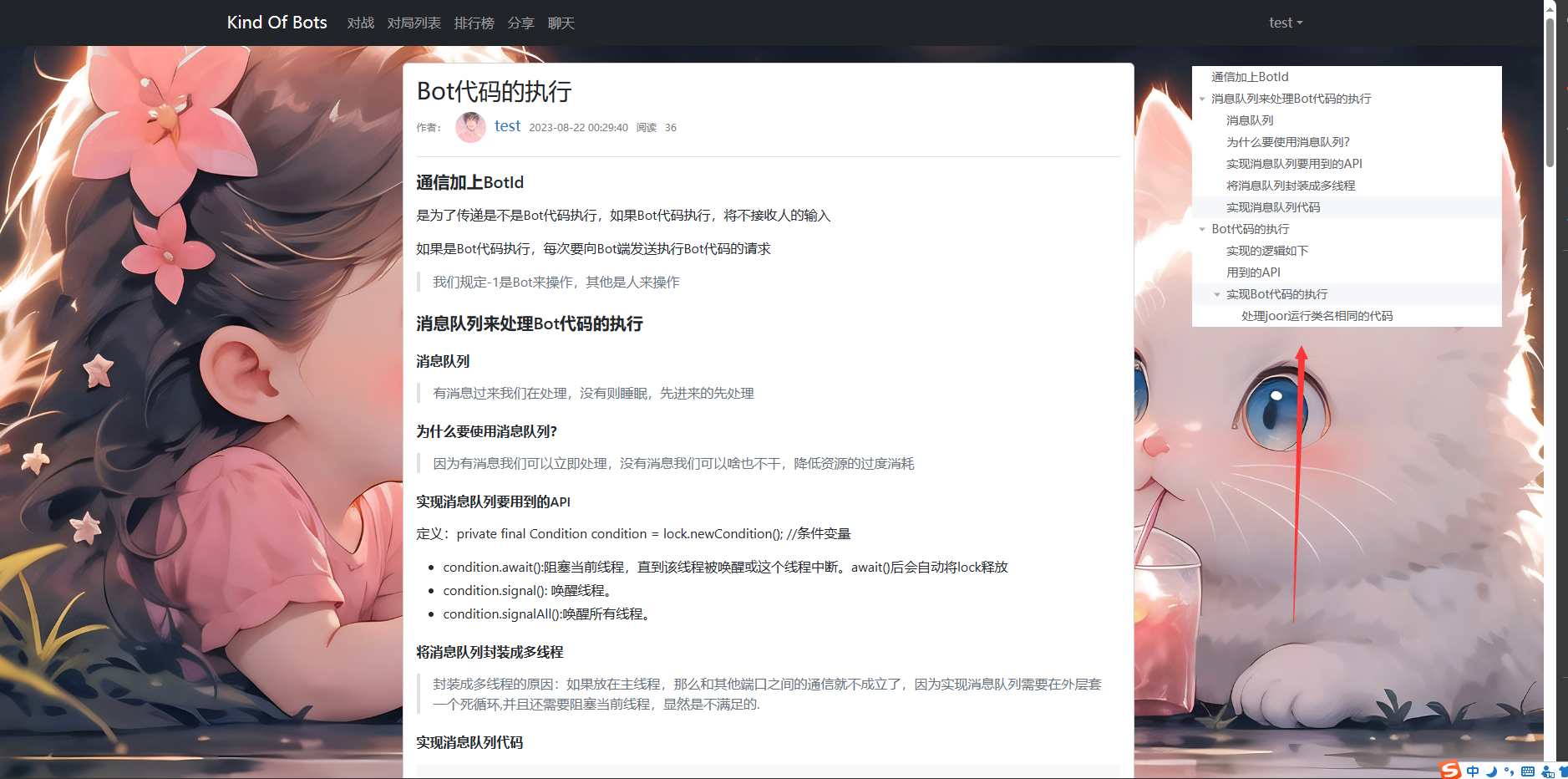作者:过....,编程导航 编号 30885
markdown转换成html参考:https://blog.csdn.net/weixin_45894305/article/details/106362783?spm=1001.2014.3001.5506
添加css即可,一般直接在父标签上设定一个类名然后给子标签加样式: 可以在github上找一个用:https://github.com/sindresorhus/github-markdown-css
这是因为转换后dom加载需要一定的时间,在这个时间内操作会出现 null 问题,解决:
setTimeout(() => {
//要处理转换html后的逻辑
},1)一般参数1毫秒即可,最好设大一点
当dom渲染上去后,我们去获取到用于渲染html文本的标签的所有子标签
document.querySelector(".markdown-body").childrenconst regex = /h(10|[1-9])/g;
for (let i = 0; i < document.querySelector(".markdown-body").children.length; i++){
if (htmlContent[i].localName.match(regex)) {
}
}大纲一般都有父子关系,我们需要去对每个标题进行父子关系的处理,比如标题 3 在标题 1 的后面,那他就是标题 1 的子标题
const treeData = ref([]);
//是否找到子目录
let isFind = false;
//解析子目录
const setSubDirectory = (directory, level, label) => {
//表示当前的目录层级
const curr = directory
//表示递归的目录层级
const children = directory.children
if (children.length > 0) {
//递归子目录,从最后一个孩子开始
setSubDirectory(directory.children[children.length-1],level,label)
}
//子目录已经归位
if (isFind === true) return;
//当前层级小于等于目录层级,表示找到了目录
if (curr.level < level) {
isFind = true
curr.children.push({ level, label,children: []})
}
}
//解析html,生成目录树
const setTreeDataByHtml = (htmlContent) => {
const regex = /h(10|[1-9])/g;
for (let i = 0; i < htmlContent.length; i++){
if (htmlContent[i].localName.match(regex)) {
const level = parseInt(htmlContent[i].localName.replace("h", ""))
const label = htmlContent[i].innerText
//不需要找子目录
if (treeData.value.length === 0 || treeData.value[treeData.value.length - 1].level >= level) {
treeData.value.push({ label, level,children: []})
} else {
isFind = false
setSubDirectory(treeData.value[treeData.value.length - 1],level,label)
}
}
}
}细节:我们将标题分为两类,一种是直接可以用作父标题,一种则是需要添加在父标题中的子标题 如果当前标题的层级小于等于数据中最后一个父标题的层级,那么他就是父标题,直接添加到数组中即可 子标题通过递归的方式,先找到最底层的标题,依次往上寻找,直到找到合适的位置即可 合适的位置:子标题的层级大于父标题的层级,这里我们用level来表示
通过 element-plus 中的 tree组件库来实现
tips: 复制过去记得改,是拿以前项目写的
文章详情页,在此引用大纲页面,为 ArticleTree,调用 ArticleTree 里的函数生成大纲的函数在82行
<template>
<div class="container view">
<div class="card">
<div class="card-body">
<h3>{{ share.title }}</h3>
<span class="author_descibe" style="margin-left: 0px">作者:</span>
<router-link class="ToOpenShare" :to="{ name: 'home' }">
<img :src="share.authorPhoto" alt="" />
<span class="author" style="font-size: 18px; margin-left: 10px"
>{{ share.author }}
</span>
</router-link>
<span class="createtime">{{ share.createtime }}</span>
<span class="reading_descibe">阅读</span>
<span class="reading">{{ share.reading }}</span>
<hr />
<div v-html="share.content" class="markdown-body"></div>
</div>
</div>
<hr />
<CommentView :shareId="route.params.shareId" />
</div>
<ArticleTree ref="ArticleTreeRef"/>
</template>
<script>
import $ from "jquery";
import { useRoute } from "vue-router";
import { useStore } from "vuex";
import { reactive, onMounted,ref } from "vue";
import CommentView from "@/views/share/comment/CommentView.vue";
import { marked } from 'marked';
import ArticleTree from "./ArticleTree.vue";
export default {
components: {
CommentView,ArticleTree
},
setup() {
const store = useStore();
const route = useRoute();
const ArticleTreeRef = ref(null)
const share = reactive({
title: "",
createtime: "",
content: "",
reading: null,
authorPhoto: "",
author: "",
});
onMounted(() => {
const link = document.createElement('link')
link.type = 'text/css'
link.rel = 'stylesheet'
link.href = 'https://cdn.bootcss.com/github-markdown-css/2.10.0/github-markdown.min.css'
document.head.appendChild(link)
});
//打开某一分享页面就调用
const getShare = () => {
$.ajax({
url: "https://app5608.acapp.acwing.com.cn/api/get/share/",
type: "get",
data: {
userId: store.state.user.id,
shareId: route.params.shareId,
},
headers: {
Authorization: "Bearer " + store.state.user.token,
},
success(resp) {
// eslint-disable-next-line no-empty
if (resp.error_message === "successfully") {
share.title = resp.share.title;
share.createtime = resp.share.createTime;
share.content = marked(resp.share.content)
setTimeout(() => {
ArticleTreeRef.value.setTreeDataByHtml(document.querySelector(".markdown-body").children)
},1)
share.reading = resp.share.reading;
share.authorPhoto = resp.authorPhoto;
share.author = resp.author;
}
},
error() {},
});
};
getShare();
return {
share,
route,
ArticleTreeRef,
};
},
};
</script>
<style scoped>
.view {
margin-top: 20px;
}
.container {
max-width: 900px;
}
hr {
color: gray;
}
img {
border-radius: 50%;
width: 4vh;
height: 4vh;
margin-left: 10px;
line-height: 15px;
}
.author_descibe,
.createtime,
.reading_descibe,
.reading {
font-size: 12px;
color: gray;
margin-left: 10px;
}
.ToOpenShare {
color: rgb(51, 122, 199);
text-decoration: none;
line-height: 30px;
font-size: 16px;
}
.ToOpenShare:hover {
color: rgb(35, 82, 124);
text-decoration: underline;
}
</style>ArticleTree
<!-- 将文章目录以树的形式展示 -->
<template>
<el-tree :data="treeData" :expand-on-click-node="false" class="tree"></el-tree>
</template>
<script setup>
import { ref,defineExpose } from "vue";
const treeData = ref([]);
//是否找到子目录
let isFind = false;
//解析子目录
const setSubDirectory = (directory, level, label) => {
//表示当前的目录层级
const curr = directory
//表示递归的目录层级
const children = directory.children
if (children.length > 0) {
//递归子目录,同层级下,数组下标在其范围即可
setSubDirectory(directory.children[children.length-1],level,label)
}
//子目录已经归位
if (isFind === true) return;
//当前层级小于等于目录层级,表示找到了目录
if (curr.level < level) {
isFind = true
curr.children.push({ level, label,children: []})
}
}
//解析html,生成目录树
const setTreeDataByHtml = (htmlContent) => {
const regex = /h(10|[1-9])/g;
for (let i = 0; i < htmlContent.length; i++){
if (htmlContent[i].localName.match(regex)) {
const level = parseInt(htmlContent[i].localName.replace("h", ""))
const label = htmlContent[i].innerText
//不需要找子目录
if (treeData.value.length === 0 || treeData.value[treeData.value.length - 1].level >= level) {
treeData.value.push({ label, level,children: []})
} else {
isFind = false
setSubDirectory(treeData.value[treeData.value.length - 1],level,label)
}
}
}
}
defineExpose({
setTreeDataByHtml
})
</script>
<style scoped>
.tree{
width: 20%;
position: fixed;
top: 80px; /* 从页面顶部的距离 */
right: 50px; /* 从页面左侧的距离 */
}
</style>只要获取到dom实例,通过scrollIntoView函数即可完成 示例:
element.scrollIntoView({
behavior: "instant",
block: "center",
});通过IntersectionObserver实例来做,当监听的dom出现在视图区域中,会触发回调函数,从而来设置高亮 示例:
// 创建 Intersection Observer 实例
const observer = new IntersectionObserver((entries) => {
entries.forEach((entry) => {
if (entry.isIntersecting) {
// 目标元素进入可视区域
treeRef.value.setCurrentKey(entry.target.id)
}
});
}, { threshold: 0 });
//将要监听的目标元素加入Observer中
observer.observe(htmlContent[i])htmlContent[i] 代表你要监听目标元素的dom
